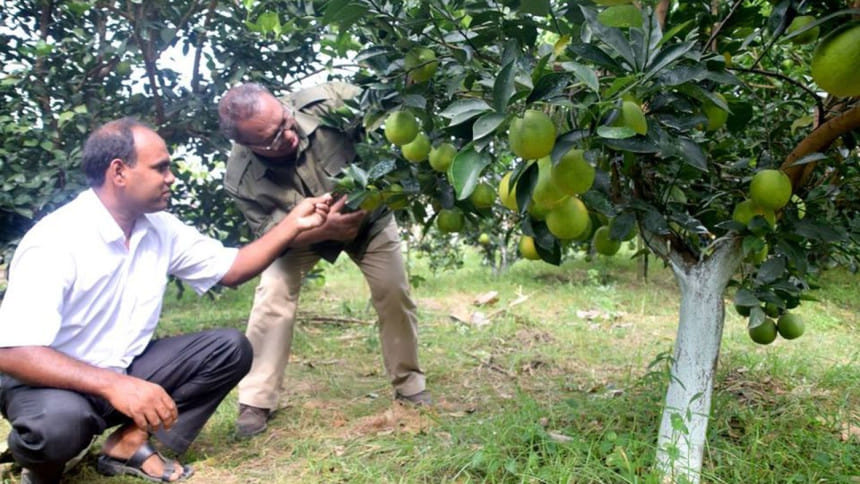Millions to earn from malta

Today is the World Food Day and this year's theme is: Grow, Nourish, Sustain. Together, its actual meaning during this time of COVID-19, we must reflect on our most basic needs. Food is the quintessence of life and core of our cultures and communities. Access to safe and nutritious food will continue to be an indispensable part of the response to the COVID-19 pandemic, particularly for deprived and vulnerable communities. I completely agree with the theme of the UN Food and Agriculture Organization (FAO) and it is a timely one indeed. Today, I will share with you a story about one of the heroes of our country whose contribution alike others is extremely significant and so much contributing at this critical moment of the pandemic.
In May-June this year, when the corona infection was at its peak in our country several news on malta fruit was published in different newspapers. Since malta has an abundance of vitamin C, the demand for it was also high. On the other hand, the whole world was in lockdown during that period. Imports and exports were also somewhat sluggish. Taking this opportunity, the syndicates unusually raised the price of malta. After reading the investigative reports, I came to know that malta was sold in the wholesale market at Tk 85 (USD 1) per kg at the beginning of the holy Ramadan this year. The demand for malta was increased so much during Ramadan. The unscrupulous syndicate increased the price like the way they wanted. Malta has also been sold at Tk 180 (USD 2.12) per kg at the retail markets. In the last few years, there has been a massive increase in malta cultivation throughout the country. The taste of our malta is no less than that of imported malta, rather, the sweetness is 10 to 15 percent higher.
The impact of coronavirus has taught the people of the world that food is not just a taste of the tongue, it is not only a pleasing experience but it has to be the source of nutrition. If the body does not get balanced nutrition from food, it can break down in any disease. The body's immune system, which comes from food-nutrition, also needs to be boosted to fight the deadly virus. So nutrition is a must. Fruits should be included in the daily food menu along with other foods. Talking to the fruit sellers, I learned that the demand for fruits in the market during this corona period is many times higher than the last few years. And this market was largely captured by the country-made malta, which have been sold at Tk 150 (USD 1.76) per kg in the retail markets. The small malta orchard of Reboti Sikder at Dakatia village in Pirojpur worked behind the spread of malta cultivation all over the country. I was astonished by the taste and sweetness of Reboti's malta, which is our country's BARI-1 variety. The taste and sweetness of this variety were far higher than the imported ones. After the episode went air on Channel i's Hridoye Mati O Manush, I kept on receiving phone calls, text messages, emails and whatnot. Especially the youth group became eager to cultivate malta. Malta was soon spread all over the country. It is not only the youth of the country who started dreaming about malta farming, but even the Bangladeshi expatriates also called and emailed me and showed interest in farming BARI-1 malta. I would also like to remind you about a successful malta farmer from Chuadanga, Sakhawat Hossain. You probably would remember Sakhawat's 40 bighas (13.22 acres) malta orchard. Three years back in 2017, I became fascinated to see the malta orchard of Sakhawat. Since 2016, people from different professions took the enterprise of cultivating malta and surely the contribution of so many, boosted up the production of this very special fruit across the country.
A man from the south-west district of Meherpur, living in Mujibnagar called me. His name is Ismail. In 2016, he came back from Korea with the dream of his farm. Later on, he started his malta orchard on 12 kathas land (0.19 acres) in Monakhali village, 10-km south of Meherpur Sadar upazila. I saw the possibility in him of another Reboti Sikder. When I went there, I saw Ismail has 48 malta trees in his orchard. The trees filled with so many maltas were all bent down. Ismail shared his story with me. He chased the dream of settling in South Korea. After five and a half years of living abroad, he didn't find anything that could make him prosper. The soil of the country was always in his mind. "When in South Korea, I used to watch episodes of Hridoye Mati O Manush on YouTube," shared Ismail. Reboti Sikder became his inspiration. After returning to the country, Ismail started his malta orchard. He thinks malta farming is comparatively easy and profitable. The first-year investment was Tk 20,000 (USD 235.76). After taking care of the trees with some fertilizer and cleaning for a year or so, he saw malta fruits in the second year. He sold malta, the second year and earned about Tk 20,000. He earned Tk 70,000 (USD 825.15) next year. Afterwards, his profit crossed Tk 1 lakh (USD 1178). Hridoye Mati O Manush brought the images of Ismail's success. He even made more profit by selling malta saplings. Malta has changed all the calculation of profit for Ismail. In the year 2020, Ismail spread his orchard from 12 katha to 19 bighas (6.28 acres) with 4,000 malta trees. It's a mind-blowing success. The market price of Ismail's malta is around Tk 120 (USD 1.41) per kg. Ismail says, in three to four years of sowing the BARI-1 variety, any tree can give around 40 kgs of malta, a season. For example, if you have 4,000 trees in a big orchard, you would certainly get around 4,000 maunds (Approximately 1,50,000 kgs) malta. If you can get Tk 100 (USD 1.17) per kg, you would perhaps earn around 1,50,00,000 (USD 176816.26). Ismail also planted the short-variety Vietnamese coconut. He's also doing orange. Ismail certainly has become a hero of agricultural success in Bangladesh and an inspiration to the entrepreneurs.

When I visited Ismail's orchard in 2016, his malta orchard in Meherpur was about 6 bigha (1.98 acres), but it has increased to about 350 bighas (115.70 acres) in 2020. This is what is called by 'extension.' That's what accomplishment is all about. True entrepreneurs like Ismail could spread the spirit of farming across the country. So many others are now following his footsteps.
Dear readers, farming has evolved and went through many diversified paths. I have always said that a class of enterprising and confident youth is taking the Bangladeshi farming scenario forward. Ismail is one of those brilliant agro-entrepreneurs. I believe that his success will also open the eyes of many new entrepreneurs in the country. This corona pandemic informs us that agriculture is one of the most reliable sectors at the moment. Relying on which, dreams can be seen and achieved. I wish Ismail continued success and look forward to numerous success stories in the farming sector of the country.
In a desperate time like this, it is more significant than ever to recognize the need to support our food heroes. I dedicate this article to all the food heroes of Bangladesh, the farmers and workers in the food system, the policymakers and the media, whose combined efforts have ensured that food is making its way from farm to fork, even during the unprecedented COVID-19 catastrophe.

 For all latest news, follow The Daily Star's Google News channel.
For all latest news, follow The Daily Star's Google News channel. 



Comments